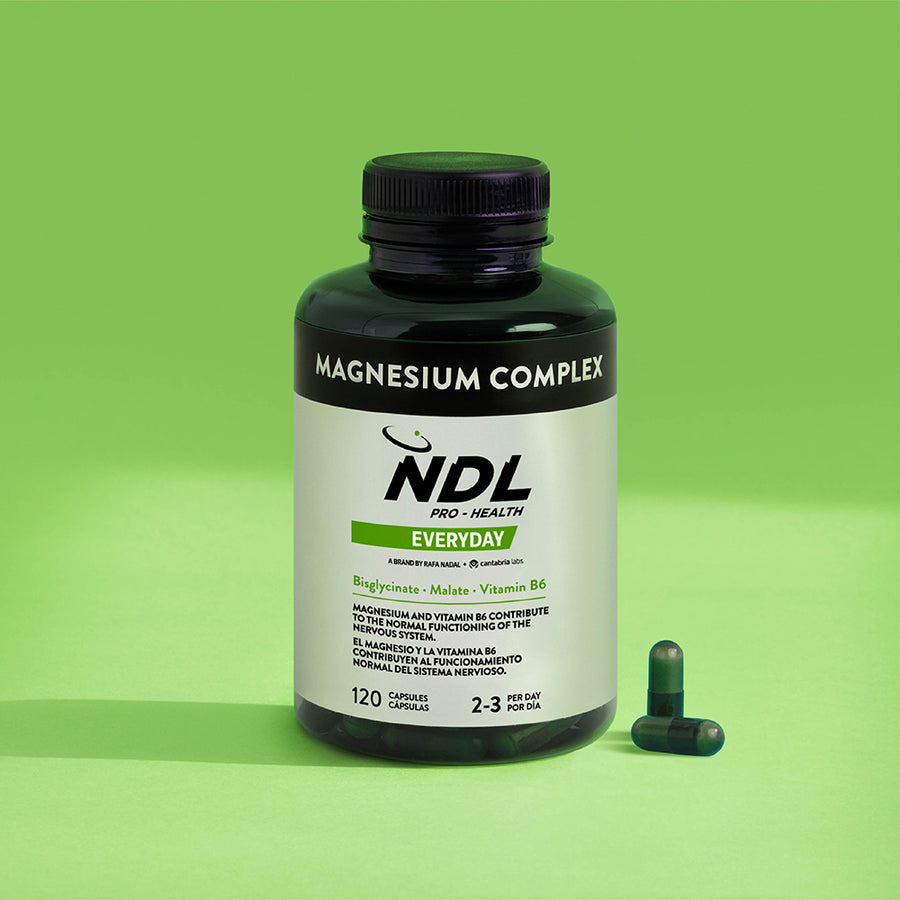Featured Products

Triple Magnesium
See productSleeping well shouldn’t be a luxury, but for millions of people, it is. Insomnia, waking up at night, or simply the feeling of not being well-rested have become part of everyday life.
In response to this reality, more and more people are looking for natural alternatives to improve their sleep without resorting to harsh solutions or medication. Among them, magnesium stands out for its key role in balancing the nervous system—and among its many forms, magnesium glycinate has earned a special place for its ability to promote deep, restorative sleep.
What is Magnesium Glycinate?
Magnesium glycinate is a specific form of magnesium in which this essential mineral is combined with glycine, an amino acid known for its calming effects on the nervous system. This combination not only improves its absorption in the body (known as high bioavailability) but also enhances its relaxing properties.
Unlike other forms of magnesium, such as oxide or citrate, glycinate is much gentler on the digestive system, making it an excellent option for those with sensitive stomachs. It also doesn’t have a laxative effect, allowing for regular use without discomfort.
What makes magnesium glycinate unique is that it works in two ways: it delivers magnesium, which is involved in over 300 enzymatic processes in the body related to muscle and neurological relaxation; and glycine, which has a calming effect and supports sleep onset.
Benefits of Magnesium Glycinate for Sleep
One of the main benefits of magnesium glycinate for sleep is its calming effect, which, as mentioned, comes from the synergy between magnesium and glycine working directly on the body’s relaxation and sleep mechanisms. Here are some of its key benefits:
- Supports relaxation of the nervous system: Magnesium helps regulate neurotransmitters like GABA (gamma-aminobutyric acid), which promote the calm state needed for falling asleep.
- Reduces stress: By lowering activity in the sympathetic nervous system (the "alert mode"), magnesium glycinate helps stop racing thoughts that prevent nighttime relaxation.
- Supports natural melatonin production: In addition to being calming, glycine supports the circadian rhythm and can improve sleep quality by promoting more stable sleep cycles.
- Improves deep sleep quality: It not only helps you fall asleep faster but also reach deeper, more restorative sleep phases—resulting in greater energy and mental clarity upon waking.

Some studies have shown that both glycine and magnesium independently have positive effects on sleep. Combined, they can be a powerful tool for those struggling with insomnia or disrupted rest.
Who Is It Ideal For?
The people who may benefit most from using magnesium glycinate include:
- Those with occasional insomnia or trouble falling asleep: If you have difficulty falling asleep or wake up several times during the night, this supplement may help you achieve deeper, more consistent rest.
- Older adults: As we age, magnesium levels tend to decline, which can affect sleep. This form of magnesium is gentle and easy to absorb for them.
- People who train frequently or exercise intensely: Magnesium is key for muscle recovery. Taking it before bed supports rest and physical recovery.
In short, it’s a safe and effective solution for those looking to care for their sleep holistically—especially when combined with good sleep hygiene.
How to Take It: Dosage and Recommendations
Magnesium glycinate is well tolerated by most people and is generally safe when the proper dosage is followed. For it to be truly effective for sleep, here are a few guidelines to keep in mind:
- When to take it? Ideally, take it at night, about 30 to 60 minutes before going to bed. This gives the body time to absorb it and support relaxation mechanisms.
- Typical recommended dose: The amount varies by individual, but a common dose ranges from 200 to 400 mg of elemental magnesium per day. It's best to start with a lower dose and gradually increase if needed.
- With or without food? Magnesium glycinate can be taken with or without food, though those with sensitive stomachs may find it more comfortable to take it with a light snack.
- Duration of use: It can be used occasionally during times of stress or sleep disruption, or as part of a daily routine to support long-term sleep health. As with any supplement, consistency makes the difference.
It’s always a good idea to consult with a healthcare professional, especially if you’re taking medications or have any medical conditions.
In conclusion, getting quality sleep isn’t always easy—but with the right support, it’s possible. Magnesium glycinate stands out as a natural and effective option to improve sleep, thanks to its calming effect and excellent tolerability.
A small change can transform your nights. Give your body what it needs to truly rest.

From the NDL Pro-Health team we will provide you with tips to maintain a healthy lifestyle. Sharing knowledge and product recommendations to offer optimal solutions for your daily routine, for your workouts and subsequent recovery, all with the goal of helping you achieve physical and mental wellness.

















